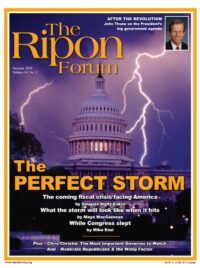 Accountability seems to be a watchword in Washington these days. It is preached by the President, spoken by the Speaker, and has become a standard component of Democratic rhetoric this year.
Accountability seems to be a watchword in Washington these days. It is preached by the President, spoken by the Speaker, and has become a standard component of Democratic rhetoric this year.
But in one important area of government spending, the Democrats have chosen to throw accountability out the door. The area is Medicare. Current law requires that an annual report be issued by April 1st of each year outlining the fiscal health of this program upon which so many seniors rely.
The report is issued by the Medicare and Social Security Trustees, who are appointed by the President and tasked with making sure these programs remain solvent. In recent years, these reports have taken on greater prominence, due in no small part to the fact that baby boomers are retiring and people are concerned about the added financial pressure that will be placed on the Medicare system as a result.
This year, however, the report was not released by April 1st. When asked about the delay, an unnamed source at the White House made a cryptic comment about the report being “obsolete,” before eventually settling on the excuse that the report would be issued once the budgetary impact of the new health care law on the Medicare program could be assessed and taken into account.
This year, however, the report was not released by April 1st. When asked about the delay, an unnamed source at the White House made a cryptic comment about the report being “obsolete”…
Originally, the White House indicated this assessment would occur by June 30th. When that date came and went and no report was issued, rumors began circulating that the date had once again been pushed back — this time to August, a month when Congress will be out of session and the focus of the American people will, in theory, be on something else. Naturally, a good many Americans are concerned about this delay. Many members of Congress are also concerned.
In fact, Senators Judd Gregg (R-NH) and Orrin Hatch (R-UT) wrote to the Obama Administration last month demanding that they release their annual assessment of the program immediately. “The 2009 Medicare Trustees Report laid out a grim assessment of the financial status of the Medicare program,” the pair wrote. “Fueled by an aging population and rising health care costs, Medicare expenditures, according to that report, would rise from 3.2 percent of Gross Domestic Product (GDP) in 2008 to 11.4 percent of GDP in 2083. The 2009 Trustees Report estimated that Medicare’s unfunded liability is $38 trillion over the next 75 years and that it’s Hospital Insurance (HI) Trust Fund is expected to become insolvent in 2017. For Congress to effectively address the critical challenge of Medicare solvency, it must have a complete and accurate assessment of the program’s fiscal position.”
But it’s not just the delay in providing this assessment that has Gregg, Hatch, and many other Americans concerned. It’s the fact that two of the Trustees who are supposed to review and approve it have not yet been appointed to the Medicare Board. Under current law, the annual report is intended to be signed by six trustees. Four of the trustees are administration officials; they are the Secretary of Health and Human Services, the Secretary of Treasury, the Secretary of Labor, and the Commissioner of Social Security.
The other two members of the Medicare Board of Trustees come from outside the Administration and are members of the public. The appointment of these two public trustees dates back to the mid-1980s, when former Democratic Senator Patrick Moynihan of New York advocated their selection as a way to not only increase public confidence in the program, but provide a perspective that was not swayed by the current administration.
At a time when Medicare is under increasing financial pressure, the positions are vacant, and the report that for over 25 years has been providing Americans with a better understanding about the program’s future sits on a shelf somewhere, presumably collecting dust.
Unfortunately, these two public trustees have not yet been appointed by President Obama. At a time when Medicare is under increasing financial pressure, the positions are vacant, and the report that for over 25 years has been providing Americans with a better understanding about the program’s future sits on a shelf somewhere, presumably collecting dust.
Of course, that doesn’t mean the Administration has turned its back on Medicare. In fact, over the July 4th holiday recess, President Obama appointed Sir Donald Berwick as the new Administrator of the program. Typically, Berwick’s appointment would need to be approved by Congress. Because the House and Senate were out of session, this did not occur.
This recess appointment allowed Berwick to avoid answering key questions as to why the annual report on the health of Medicare is being delayed and, more critically, whether the health care reform law is, as some fear, a threat to the long-term solvency of the program.
In the process, it also allowed the President and his Democratic allies to avoid practicing something they have been preaching a lot about these days – accountability.
Billy Pitts is a former aide to the House Republican Leadership and a member of The Ripon Forum’s Editorial Board. Lou Zickar is the Forum’s Editor.




